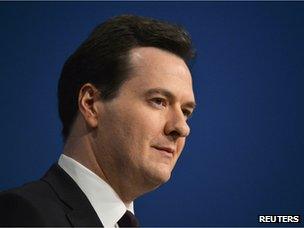Will the chancellor invest?
- Published
- comments

Many business leaders who see themselves as cheerleaders for George Osborne's attempts to reduce public spending as a share of GDP, or the value of what the UK produces each year, are concerned about the least ambiguous manifestation of austerity: sharp cuts in public-sector investment.
Their view is that with the economy still in the doldrums (although out of recession) and with the government apparently able to borrow huge sums at record low interest rates, this would be the appropriate moment for the public sector to improve the wealth-generating infrastructure of the UK.
Which is one reason why, according to ministerial sources, the big debate within the coalition government ("debate" may be a euphemism) is whether the chancellor's Autumn Statement in early December should announce a significant increase in public sector net investment.
My understanding is that the Business Secretary, Vince Cable, is strongly in favour of a boost to such capital spending, especially for housebuilding and construction - since these could generate employment relatively quickly. But I am unclear whether the Treasury will oblige.
What concerns the Treasury is that the public sector finances are in worse shape than it expected.
Even if this deterioration can be put down to factors beyond its control, such as a crisis in the eurozone that undermined the UK's economy recovery, it worries that the UK's cherished AAA credit-rating would be endangered if the government's resolve to stem the growth of the national debt was seen to be weakening.
By the way, some economists would argue, per contra, that slashed investment spending has directly contributed to lower growth and worsening public finances - but that is not an argument that the chancellor finds compelling.
What is beyond dispute is that the fall in public sector net investment has been dramatic, from 3.6% of GDP in 2009-10 to 1.8% last year and a forecast 1.4% next year. Which represents a cut of more than 60%.
By contrast, public-sector current spending, on wages and benefits and so on, has been largely flat over the past three years, at a bit more than 42% of GDP.
If austerity has meant anything, its manifestation has been fewer new schools, hospitals and roads.
So some of those who run big private sector businesses say that the chancellor got his priorities wrong: they would have preferred welfare and benefit cuts, rather than slashed investment.
That said, some would see the bosses as hypocrites in their critique - because one of the reasons they are so desperate to see the chancellor revive capital expenditure is that they have collectively been reining in their own investment plans.
As for the party politics of all this, it is quite difficult for Labour to accuse the government of wilful vandalism to the UK's productive infrastructure: the final budget of Gordon Brown's government included projections for reductions in public sector net investment that were only mildly less dramatic that what has actually transpired to date and would have led to bigger cuts next year than George Osborne currently plans.
UPDATE 16:00 GMT
A government source makes two points to me on public-sector investment.
First that the chancellor will definitely not enlarge the so-called "spending envelope".
That means any increase in investment would have to be funded by bigger cuts elsewhere - which implies there could be welfare reductions to fund more construction.
Second, in cash terms the government is spending a bit over £2bn more per annum on investment than was written into the previous government's plans (my statement that it is spending less relates to investment as a proportion of GDP).